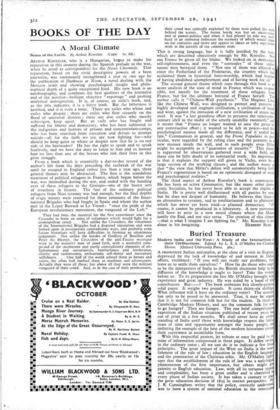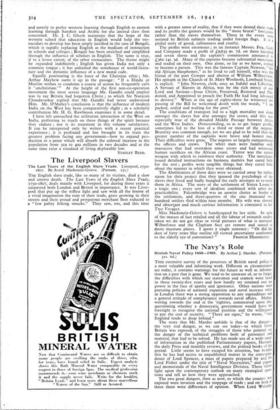Buried Treasure
Modern India and the West : A Study of the Interactions of their Civilisations. Edited by L. S. S. O'Malley for Chatham House. (Oxford University Press. 36s.) A PROMINENT Indian nationalist, at the close of a visit to England, depressed by the lack of knowledge of and interest in Indian affairs, exclaimed : " If you will not study our problems, then leave us to settle thein ourselves! " How far do those who oug to be the interpreters of India to the British electorate help in th diffusion of the knowledge it ought to have? Take the vat= before us. To its preparation the late Mr. O'Malley brought experience and great industry. He was aided by a band of abl contributors. But---? The book embraces 8io closely-prin solid pages. It weighs two pounds. It costs thirty-six shillings. What influence will it have on the ordinary voter? The ques has only to be posed to be answered. True, it may be argued that it is not for common folk but for the student. Is there Cambridge Modern History, and are the common folk for e to go hungry? They are hungry. The one brief comprehens exposition of the Indian situation published of recent years out of print in a few months. We shall never have an under standing of India until those with knowledge respect the linu tions of time and opportunity amongst the home people, imitating the example of the best of the modern historians pre their experience in assimilable form. With this respectful protest, let tribute at once be paid to th mine of information compressed in these pages. It defies revie in the ordinary sense ; all we can do is to indicate 4 few b principles. The great impact of the West on India is the essa• lishment of the rule of law • education in the English language and the penetration of the dhristian ethic. Mr. O'Malley right says that the establishment of the rule of law was a sociology phenomenon of the first importance, but others might P priority to English education. Law, with all its tortuous al) and complexities has been a great unifier and is cherished every eve phase of Indian society. It has taken a century to ph the great education decision of 5835 in correct perspective. J. R. Cunningham writes that the policy, correctly underst was to have a system of national education in the vema and merely to prefer western learning through English to eastern learning through Sanskrit and Arabic for the limited class then concerned. Dr. J. C. Ghosh maintains that the hope of the western school that education in English would help the ver- naculars to develop has been amply justified in the case of Bengali, which is rapidly replacing English as the Inedium of instruction in schools and colleges ; Bengali has been enriched and simplified through the influence of scholars in English. The same is true, if to a lesser extent, of the other vernaculars. The theme might be expanded indefinitely ; English has given India not only a common tongue ; it has unlocked the storehouse of world-litera- ture and the dynamic influence of a new moral code.
Equally penetrating is the force of the Christian ethic ; Mr. Arthur Mayhew sums it up in the passage: " If a Hindu or Muslim wishes, to condemn a course of action he frequently calls it unchristian.' " At the height of the first non-co-operation movement the most severe language Mr. Gandhi could employ was to say Britain had forgotten Christ ; to which Sir Narayan Chandavarkar replied that Mr. Gandhi had never understood Him. Mr. O'Malley's conclusion is that the influence of modern India on the West has been comparatively. slight ; in a scholarly contribution Mr. H. G. Rawlinson examines it in some detail.
I have left untouched the utilitarian interaction of the West on India, preferring to touch on these things of the spirit because they endure ; nor is its treatment in this volume satisfactory. It can be interpreted only by writers with a recent practical experience ; it is profound and has brought in its train the greatest problem facing any goVernment—how to expand pro- duction to a point which will absorb the colossal increase in the population from 319 to 400 millions in two decades and at the same time raise a standard of living deplorably low.
STANLEY REED.



























 Previous page
Previous page